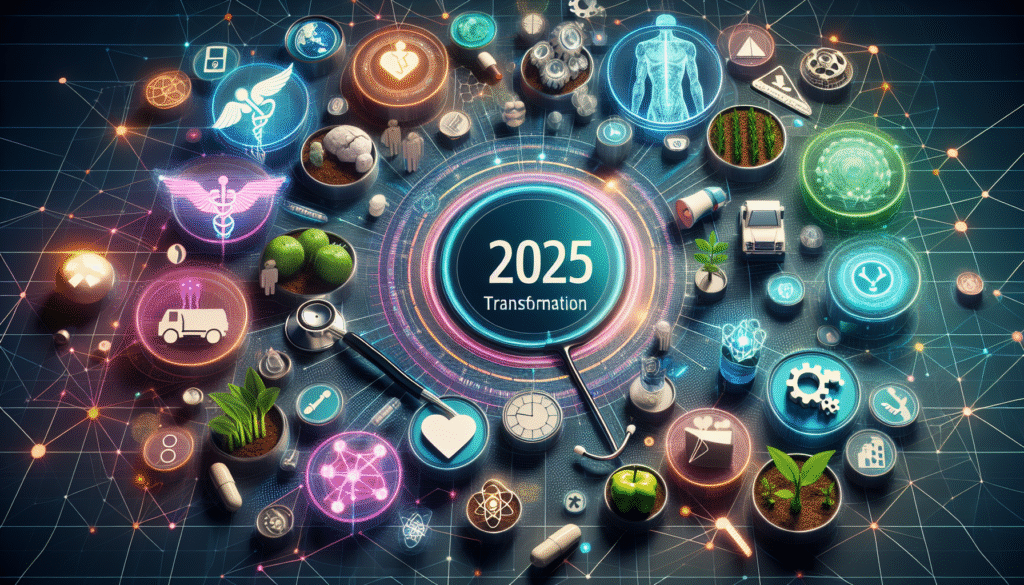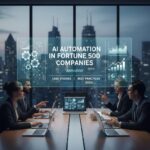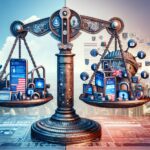AI Business Impact: Unleashing New Potentials Across Industries
As we approach 2025, the transformative impact of generative AI on businesses is becoming increasingly profound. Companies across various sectors leverage AI to enhance productivity, streamline operations, and innovate their offerings. By automating routine tasks, AI frees up human resources to focus on strategic initiatives, thereby boosting overall efficiency and driving growth. Additionally, AI-driven insights enable businesses to make informed decisions, optimize resource allocation, and personalize customer experiences.
In the financial sector, AI is revolutionizing risk management and fraud detection. Advanced algorithms can analyze vast amounts of data in real time, identifying patterns and anomalies that humans might miss. This not only enhances security but also improves customer trust and satisfaction. Similarly, in healthcare, AI is transforming diagnostics and treatment planning. Machine learning models can predict patient outcomes with remarkable accuracy, enabling personalized medicine and improving patient care. The integration of AI in these sectors is not just about efficiency; it’s about redefining the standards of service and innovation.
Moreover, AI is driving significant changes in the supply chain management sector. By predicting demand trends and optimizing logistics, AI systems help businesses reduce costs and improve delivery times. In retail, AI-powered analytics offer deep insights into consumer behavior, allowing for more effective marketing strategies and inventory management. As AI continues to evolve, its business impact will expand, creating new opportunities and challenges that companies must navigate to stay competitive.
Emerging AI Technologies: Pioneering the Future of Innovation
The landscape of AI technologies is rapidly evolving, with several groundbreaking advancements poised to redefine industries. Among these, natural language processing (NLP) and computer vision stand out as key drivers of innovation. NLP enables machines to understand and generate human language, facilitating seamless interactions between humans and machines. This technology is particularly transformative in customer service, where chatbots and virtual assistants are becoming increasingly sophisticated, capable of handling complex queries and providing personalized assistance.
Computer vision, on the other hand, empowers machines to interpret visual data, opening up new possibilities in fields such as autonomous vehicles and surveillance. By analyzing images and videos, AI systems can detect objects, recognize faces, and even predict human behavior. These capabilities are crucial for ensuring safety and efficiency in various applications, from self-driving cars to smart city infrastructure. The integration of AI into these sectors is not just enhancing functionality; it’s setting new standards for innovation and operational excellence.
In addition to NLP and computer vision, advancements in AI-driven robotics and edge computing are reshaping the industrial landscape. Robotics powered by AI are taking on more complex tasks in manufacturing and logistics, improving precision and reducing human error. Edge computing, which processes data closer to its source, is enhancing the speed and efficiency of AI applications, particularly in IoT devices. These emerging technologies are not only pioneering the future of innovation but are also redefining the way businesses operate and compete in the digital age.
Generative AI Insights: Harnessing Creativity and Innovation
Generative AI is at the forefront of technological innovation, offering unprecedented opportunities for creativity and problem-solving. By leveraging neural networks, generative AI can create new content, from art and music to product designs and marketing materials. This creative potential is transforming industries such as entertainment, fashion, and advertising, where originality and innovation are paramount. The ability of AI to generate unique and compelling content is not just enhancing creativity; it’s revolutionizing the way industries approach design and storytelling.
Moreover, generative AI is enabling businesses to prototype and test new ideas rapidly. By simulating different scenarios, companies can assess the feasibility of their concepts before investing significant resources. This not only accelerates the innovation process but also reduces the risk of failure. As generative AI continues to evolve, its applications are expected to expand, driving further advancements across various sectors. The insights gained from generative AI are not only fostering creativity but are also providing a competitive edge to businesses willing to embrace this technology.
In the world of architecture and design, generative AI is being used to create complex structures and layouts that were previously unimaginable. By analyzing vast datasets and applying advanced algorithms, AI can generate innovative designs that optimize space, aesthetics, and functionality. Similarly, in the gaming industry, AI is creating immersive environments and characters, enhancing the player experience and pushing the boundaries of interactive entertainment. These insights and applications highlight the transformative potential of generative AI in reshaping industries and redefining the possibilities of creativity and innovation.
Generative AI 2025: A Vision for the Future
Looking ahead to 2025, generative AI is set to become an integral part of our daily lives. As AI technologies become more accessible and affordable, businesses of all sizes will be able to harness their potential. This democratization of AI will lead to a surge in innovation, as companies explore new ways to leverage AI for competitive advantage. The vision for generative AI in 2025 is not just about technological advancement; it’s about creating a future where AI enhances human capabilities and enriches our lives.
In the retail industry, for instance, AI-powered personalization will become the norm. By analyzing customer data, AI systems can tailor product recommendations to individual preferences, enhancing the shopping experience and increasing sales. Similarly, in the manufacturing sector, AI-driven automation will streamline production processes, reducing costs and improving quality. The integration of AI into these sectors is not just enhancing efficiency; it’s transforming the way businesses operate and deliver value to their customers.
The healthcare industry is also poised for significant transformation by 2025, with AI playing a pivotal role in predictive analytics, patient monitoring, and personalized treatment plans. By leveraging AI, healthcare providers can offer more accurate diagnoses and effective treatments, improving patient outcomes and reducing healthcare costs. The vision for generative AI in 2025 is not just about technological innovation; it’s about creating a future where AI empowers individuals and organizations to achieve more and make a positive impact on society.
Future of Generative AI: Expanding Horizons and Opportunities
The future of generative AI is bright, with endless possibilities for growth and development. As AI technologies continue to advance, they will unlock new opportunities for businesses and society as a whole. From enhancing productivity and efficiency to fostering creativity and innovation, generative AI will play a crucial role in shaping the future of industries worldwide. The potential of AI to transform industries is not just about technological advancement; it’s about creating a future where AI drives progress and prosperity.
However, the widespread adoption of AI also raises important ethical and regulatory considerations. As AI systems become more autonomous, ensuring their transparency and accountability will be paramount. Policymakers and industry leaders must work together to establish guidelines that promote the responsible use of AI, balancing innovation with societal values. The future of generative AI is not just about technological advancement; it’s about creating a framework for responsible and ethical AI development that benefits all stakeholders.
In addition to ethical considerations, the future of generative AI will also be shaped by advancements in AI research and development. As researchers continue to push the boundaries of AI capabilities, new applications and use cases will emerge, driving further innovation and growth. The future of generative AI is not just about technological progress; it’s about creating a future where AI empowers individuals and organizations to achieve more and make a positive impact on the world.
How AI is Changing Industries: A Catalyst for Transformation
AI is a powerful catalyst for change, driving transformation across a wide range of industries. In the automotive sector, for example, AI is enabling the development of autonomous vehicles, which promise to revolutionize transportation by improving safety and reducing traffic congestion. Similarly, in agriculture, AI-powered drones and sensors are optimizing crop management, enhancing yields, and reducing environmental impact. The integration of AI into these sectors is not just enhancing functionality; it’s setting new standards for innovation and operational excellence.
In the energy sector, AI is facilitating the transition to renewable sources by optimizing energy production and distribution. By analyzing data from various sources, AI systems can predict demand patterns and adjust supply accordingly, ensuring a stable and efficient energy grid. These advancements are crucial for addressing the challenges of climate change and promoting sustainable development. The impact of AI on these industries is not just about technological progress; it’s about creating a future where AI drives sustainability and resilience.
The retail industry is also experiencing significant transformation, with AI playing a pivotal role in enhancing customer experiences and optimizing operations. By analyzing consumer data, AI systems can deliver personalized recommendations and offers, improving customer satisfaction and loyalty. In addition, AI-powered analytics provide retailers with valuable insights into market trends and consumer behavior, enabling them to make data-driven decisions and stay ahead of the competition. The impact of AI on these industries is not just about technological advancement; it’s about creating a future where AI empowers businesses to deliver exceptional value to their customers.
AI in Marketing: Revolutionizing Customer Engagement
In the realm of marketing, AI is transforming the way businesses engage with their customers. By analyzing consumer behavior and preferences, AI systems can deliver personalized content and recommendations, enhancing customer satisfaction and loyalty. Furthermore, AI-powered analytics provide marketers with valuable insights into campaign performance, enabling them to optimize their strategies and achieve better results. The integration of AI into marketing is not just enhancing efficiency; it’s revolutionizing the way businesses connect with their audiences.
Social media platforms are also leveraging AI to enhance user experiences and drive engagement. By analyzing user data, AI algorithms can tailor content to individual interests, increasing the relevance and appeal of social media feeds. This not only improves user satisfaction but also boosts advertising effectiveness, as brands can target their audiences more precisely. The impact of AI on social media is not just about technological advancement; it’s about creating a future where AI enhances user experiences and drives meaningful engagement.
As generative AI continues to evolve, its impact on marketing is expected to grow, offering new opportunities for creativity and innovation. From creating compelling content to designing immersive experiences, AI will empower marketers to connect with their audiences in more meaningful ways. The future of AI in marketing is not just about technological progress; it’s about creating a future where AI empowers businesses to engage with their customers in more personalized and impactful ways.






